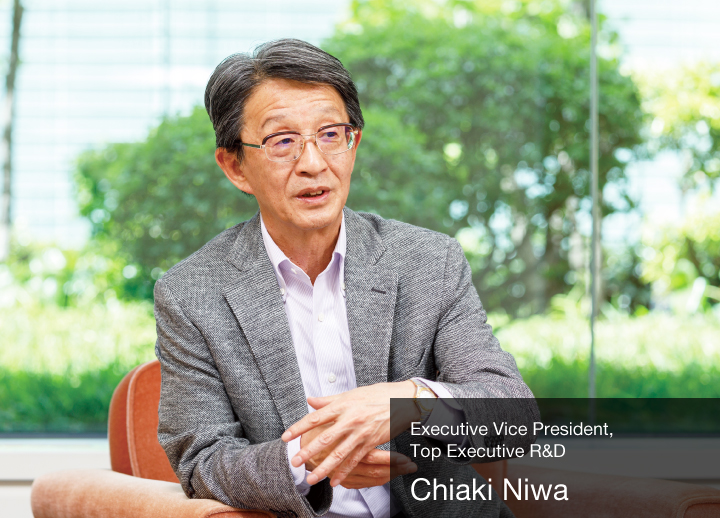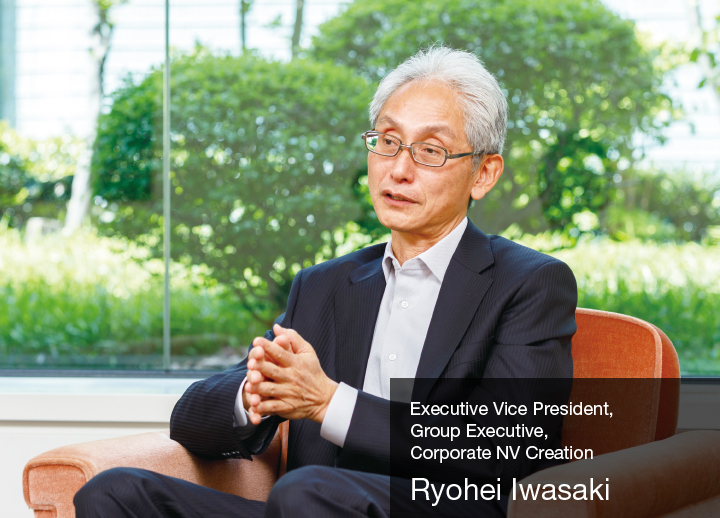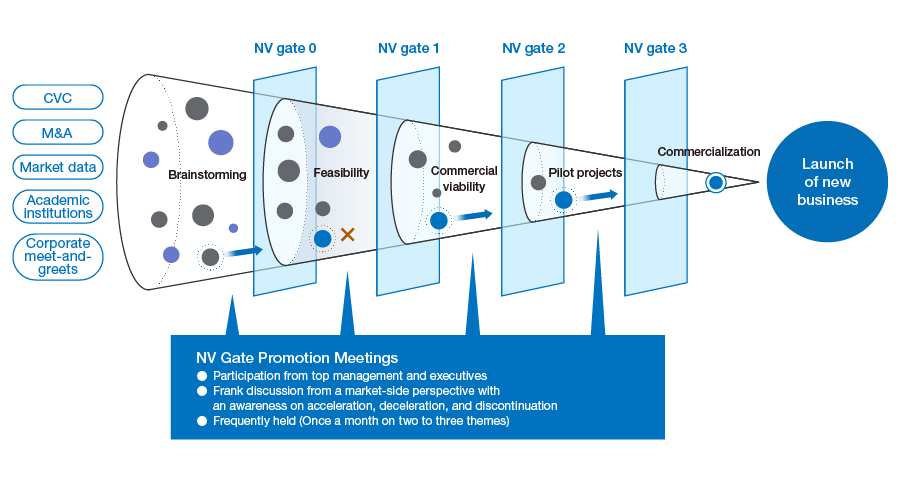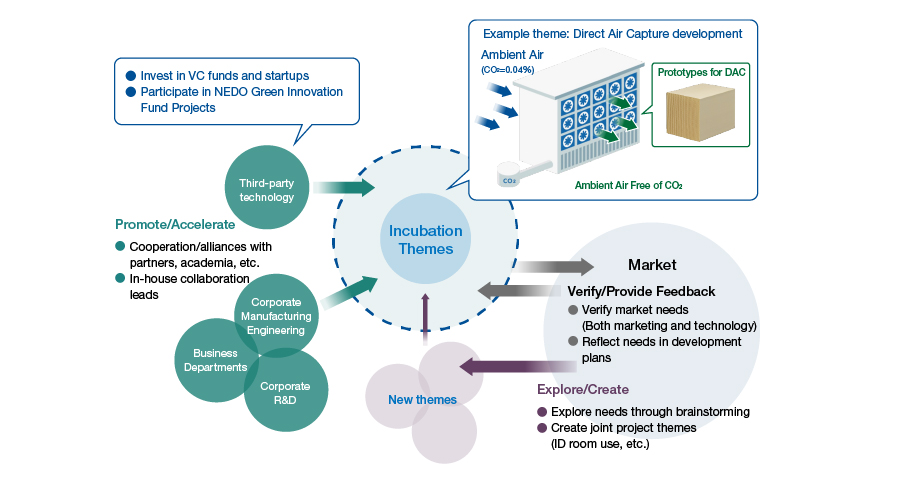Internal Roundtable
Research & Development and Commercialization
Strategies and progress of research & development and commercialization to realize the NGK Group Vision
New Value 1000 (NV1000) set as the 2030 target is one milestone of the NGK Group Vision: Road to 2050. Leaders of the Engineering and Marketing Divisions discussed the research and development as well as commercialization strategies, specific initiatives, and progress key to the NV1000 project, which aims to generate over 100 billion yen in net sales as a new business venture.
Transforming the NGK Group According to the Changing Times
— Two years have passed since rolling out the NGK Group Vision: Road to 2050.

Niwa: We drafted the NGK Group Vision in 2021 as a unified axis to give the entire Group direction. I’ve heard people on the front lines have commented on how they have been able to step up to challenges based on this vision, which has changed the corporate climate.
Iwasaki: The world is changing faster than ever before. The COVID-19 pandemic inevitably evoked social change, but there is also the tense situation happening in Ukraine, an energy crisis, and more recently the topic of generative AI. In the last two years, we have recognized how to adapt to these changes in the world and begun to confront various challenges to realize the transformations laid out in the NGK Group Vision.
Niwa: In April 2022, we established Corporate NV Creation to handle the marketing functions that should move the NV1000 project forward as an important measure to transform our business structure. As we have more opportunities to communicate with our customers through this new division, we are realizing that we will not be able to grow in the future without a firm focus on what the market demands and the value we can provide to our customers. As an organization that has traditionally been a technology-oriented company, a strong product-out mentality that if we make something good it should sell has taken root in NGK. This way of thinking has to change.
Development and Commercialization Committee and NV Gate Promotion Meetings to Increase Commercialization Success
— The NGK Group launched a Development and Commercialization Committee.

Iwasaki: The Development and Commercialization Committee with Executive Vice President Chiaki Niwa acting as the chair and myself as the vice chair formulates policies on in-house research and development and the commercialization process.
Niwa: The NGK Group is a corporate conglomerate that has amazing manufacturing technologies. However, this does not mean the NGK Group can contribute to the world simply because it has superior technologies. This is demonstrated by our lack of market analysis so far and cases where we have been unable to grow businesses as expected. NGK launched this committee to lay the groundwork clarifying our trajectory to engage in development with the goal of commercialization. The important pursuit is social implementation rather than simply chasing technologies.
Iwasaki: As a precursor to the new Development and Commercialization Committee, we also started to convene NV Gate Promotion Meetings. These meetings bring together top executives to discuss what is lacking to move into the next stage of development and how to overcome these obstacles. We keep in mind the market perspective when speaking frankly about the development themes raised in these discussions from many different angles.
Niwa: We convene the NV Gate Promotion Meetings on a monthly basis to thoroughly debate two to three development themes. Some of these themes are more carefully debated over several meetings to go even deeper through a more comprehensive discussion.
Iwasaki: We analyze the commercial viability from the initial idea stage, the pros and cons, and consider various other factors in an effort to clarify the challenges. The incorporation of this process acts as an effective venue by creating frequent opportunities for active debate about whether to inject management resources, move forward, or step back a bit. The discussions at the NV Gate Promotion Meetings undertake development and commercialization while giving those in charge of each theme a sense of both security and tension because the managers and executives understand how one another feel about each of these themes. Over the last year, I think these meetings have settled into this fantastic flow.
NV Gate Promotion Meetings for New Product Commercialization Process and Resolving Issues

Shift from Selling Products to Rendering Services in Order to Achieve NV1000
— How is the NV1000 project progressing?
Niwa: Coordination between the Corporate NV Creation, R&D, and Manufacturing Engineering are key to achieving the NV1000 goals, which is one area where we have made a lot of progress. The Corporate NV Creation marketing team shares the market and customer needs, it has identified with the R&D and Manufacturing Engineering. This new process has begun a cycle that helps develop products and cultivate businesses generating real value.
Iwasaki: We are very aware of the market fit and have been furthering preparations to create new business ventures in a variety of markets. For example, EnerCera is a series of compact and thin rechargeable lithium-ion batteries that capitalizes on IoT and other such technologies. NGK is already involved in several business tie-ups after many companies with expectations that this integration of technologies will enable broad expansion have reached out to us. EnerCera is a product unlike any other. It offers great potential to bring new added value when combined with a wide range of other solutions. Many have great expectations for EnerCera as one of many examples demonstrating this shift from selling things to rendering services underway throughout the entire NGK Group.
Niwa: Our business utilizing the NAS large-capacity battery storage system is another example of our services. The NGK Group has been developing a new local electric power business over the last several years that integrates these NAS batteries into a solar power generation system. Currently, Ena Electric Power (Ena City, Gifu) and Abashiri Electric Power (Abashiri City, Hokkaido) are two local electric power companies using our system. NAS batteries offer a product that can play a major role in carbon neutrality thanks to many benefits that include energy devoted to local production and local consumption. The technology can also contribute to stronger disaster response capabilities when used as an emergency power system. In the future, we will expand our network with local companies and other types of partners nationwide as a basic policy.
Iwasaki: As a solution for carbon capture, utilization and storage, known as CCUS, NGK possesses a sub-nano ceramic membrane technology that can be used to filter out elements at a molecular level. The use of this technology enables the separation of not only CO2, but also hydrogen, nitrogen, and other chemicals. In the course of efforts to realize carbon neutrality around the world, society has an increasing need for technologies that can capture and collect CO2 in every setting. That is why NGK will strive to further improve capture functionalities with the aim to roll out practical applications by 2030. We are also focusing on developing new products for direct air capture (DAC), which directly captures CO2 present in the air by applying our mainstay ceramics for automotive exhaust gas purification. I hope that we can start proof-of-concept testing by 2025.
Niwa: The key is to create powerful services unique the NGK Group just for the manufacturing industry. There are many specialized service companies, so it will not be easy to beat the competition. To surpass our competitors, we must identify unique added value which makes people see the NGK Group as a company that makes this or that possible.
External Partnerships for Business Expansion Around Strengths and More Rigorous Recruitment of Experienced Persons
— Could you please tell us about the strengths of the NGK Group?
Niwa: Our undeniable strength is in the unique NGK ceramic technologies. By taking advantage of the ceramic technologies amassed through the century of history and experience gained since our founding, we are able to provide a broad range of products from ceramic substrates for automotive catalytic converters to parts for equipment to manufacture semiconductors and electronic components. To bring out the full potential of ceramics, we are also expanding applications to numerous industries. There is no question in my mind that only the NGK Group has the technology, knowledge, engineers, and equipment all in place to provide solutions for a wide variety of things.
Iwasaki: We will maintain our competitive edge around our strength in ceramic technologies and respond to the needs of society, which I think will help us achieve the NV1000 target in the long run. The key will be to pay attention to the market fit. In other words, it all depends on whether we can create products and services better suited to market and customer needs. External partnerships are one area that we are strengthening to accomplish this. Over the last year, we gathered a greater number of experts to collaborate with as confidants and advisors in order to ramp up efforts toward social solutions together with partners in various fields. To create new value never seen before, the NGK Group needs the insight of these experts in a wide range of fields. By bringing in these people at the initial stages of development, I have no doubt that we can increase our commercialization success.
Niwa: We are also steadily broadening partnerships with academic and specialized research institutes. More specifically, the NGK Group is advancing leading-edge research with several universities in Japan. It has been difficult for us to secure human resources who possess expert knowledge in fields outside of our purview. Partnerships with external institutions provide tremendous benefit by giving us access to the knowledge of researchers who are experts in those fields. As an organization that has only relied on itself in the past, we are very grateful to have some outside perspective. Through these partnerships, we are able to understand our weaknesses and the obstacles in our way so that we can change course at the early stage. As a result, these partnerships have helped accelerate our development and commercialization.
Iwasaki: We are also concentrating more on recruiting experienced human capital. Bringing in people who have gained experience at other companies lets us gain new perspectives, knowledge, and networks that the NGK Group currently does not have, which enhances our ability to create new products and services. Furthermore, in order to capture information on new and innovative technologies and business models, etc., we have begun investing in venture capital and start-up companies.
Initiatives to Achieve NV1000

— What kind of challenges do you currently see?
Iwasaki: Looking at the marketing team, I think we are still weak at gathering information. We have a tendency to seek out praise and positive information about our technologies. To connect our ideas to business, we have to get a hold of the negative information on what we lack and how to overcome those problems. This negative information is vital to the social implementation of products. In order to receive negative information, it is necessary to establish a solid trusting relationship. That is more difficult than getting good information. Keeping all this in mind, I hope each one of us can hone our communication skills. Moreover, I believe that we will have more opportunities to work with companies outside of Japan in the future. Of course, these collaborations require communication skills aware of the multicultural differences, such as the various challenges related to different languages, cultures, traditions, and values. I think the only choice that we have is to focus on global human resource development that can teach these skills.
Niwa: In regard to our human resource development, we recently drafted the new NGK Group Human Capital Management Policy. To accomplish the targets laid out by the NGK Group Vision, I know it is important to develop human resources who can step up to challenges and execute our transformations, key persons who can foster the digital transformations propelling research and development as well as commercialization, and those who have the marketing and technical expertise to participate on the global stage. The NGK Group has launched various initiatives that include those to nurture our internal environment and others to reform personnel policies. There is one other aspect to this as well. Although we have made headway in forging external partnerships, we still tend to have an internal focus. The NGK Group needs to escape this self-reliance and secretiveness to create a more open organization. For example, we should actively release our research and development results to evoke debate, which should provide significant returns to the NGK Group.
Iwasaki: Another challenge is accelerating the speed of each process. Social and environmental changes are happening at an unprecedented speed. I think the NGK Group also has to take action with the same emphasis on speed. In research and development, we are also incorporating materials informatics (MI)* that utilizes accumulated data and promoting DX to speed up and improve efficiency.
Materials informatics (MI): Applying informatics (information science) such as machine learning and big data, the core technology of AI, towards new materials and new component development
Material Risks and Opportunities
— Could you please tell us your thoughts about how to respond to the risks and opportunities tied to the new Materiality the NGK Group has identified?
Niwa: The NGK Group has always engaged in what is known as ESG-type management today since its inception a century ago through its products and services because resolving social challenges gives reason for our corporate existence. In light of the changing times and perspectives on sustainability, our Materiality bring shape to this ESG Management. We frequently discussed and formulated the Materiality based on the discussions that took place when the vision was formulated. Responding to climate change, promoting resource recycling, and contributing to digital social infrastructure are directly related to “CN” and “DS,” the two pillars we have set forth, and are the cores of our thinking in the thematic development of new business creation.
Iwasaki: One risk and opportunity is the ongoing evolution to electric vehicles. This shift to electric vehicles presents a tremendous risk to the NGK Group. On the other hand, more widespread use of electric vehicles also offers new business opportunities. For example, the use of our ceramic technologies for heat management in power semiconductors applications is a huge opportunity. The sub-nano ceramic membranes mentioned earlier open more doors to a variety of opportunities pertaining to our Materiality from initiatives for climate change and promoting resource recycling to the prevention of environmental pollution. While a digital society does come with security and other such risks, I think a focus on development will expand future business opportunities. This includes the work to develop a variety of wafers used for state-of-the-art devices supporting telecommunication infrastructure. We do have a rational sense of urgency brought by the changing times but are not pessimistic. It would be wonderful if we can inspire new ideas and create new value by taking advantage of these changes. This is the sentiment behind New Value.
The Bold Challenge to Achieve NV1000
— To conclude, would you mind sharing a message with all of the NGK stakeholders?
Niwa: I want to tell our employees to take on bold challenges. I am not saying I encourage failure, but it is okay if you do not succeed. It is impossible to succeed when talking on every single challenge. The important part of taking on bold challenges is the ability to make any failure a seed for future success. Moreover, we can take on a challenge over and over again. Success will surely come at some point by continuing to persevere without ever giving up.
Iwasaki: I want everyone to dare to challenge what they think is difficult. You will face many struggles and a lot of things may not go right. However, joy of accomplishment is great and leads to personal growth. If you feel something would be impossible alone, feel free to take on that challenge as a team. Where there is a will, there is a way, so I want everyone to stay positive while trail blazing into new territory.
Niwa: I would like to let all of our stakeholders know that the new NV1000 structure has taken excellent shape into a functional organization. I feel it has created a culture of unity and hard work when goals are set. The collaboration system between the Corporate NV Creation, R&D, and Manufacturing Engineering has steadily laid the groundwork to more smoothly move from research and development to commercialization. I am confident that the NGK Group is headed in the right direction. There is no doubt in my mind that the NGK Group will reach its NV1000 goal by furthering these efforts. I hope everyone will expect great things from the NGK Group.
Note: This interview was conducted in April 2023.
